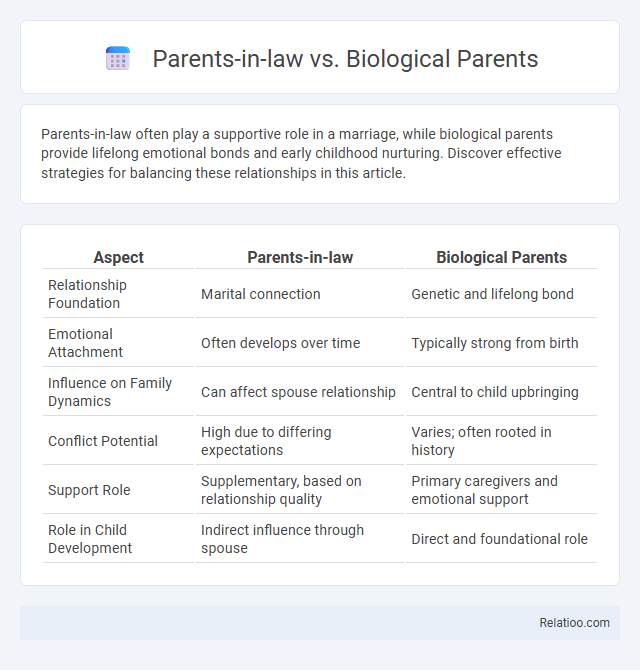Parents-in-law often play a supportive role in a marriage, while biological parents provide lifelong emotional bonds and early childhood nurturing. Discover effective strategies for balancing these relationships in this article.
Table of Comparison
| Aspect | Parents-in-law | Biological Parents |
|---|---|---|
| Relationship Foundation | Marital connection | Genetic and lifelong bond |
| Emotional Attachment | Often develops over time | Typically strong from birth |
| Influence on Family Dynamics | Can affect spouse relationship | Central to child upbringing |
| Conflict Potential | High due to differing expectations | Varies; often rooted in history |
| Support Role | Supplementary, based on relationship quality | Primary caregivers and emotional support |
| Role in Child Development | Indirect influence through spouse | Direct and foundational role |
Understanding the Roles: Parents-in-Law vs Biological Parents
Understanding the distinct roles of parents-in-law and biological parents is essential for maintaining healthy family dynamics. Biological parents provide foundational support, guidance, and lifelong connection, while parents-in-law offer extended family support and contribute to your marital relationship's strength. Balancing respect and boundaries between your biological parents and parents-in-law fosters harmony and mutual understanding in your family network.
Emotional Bonds: Differences and Similarities
Parents-in-law, biological parents, and in-laws each form unique emotional bonds shaped by biological ties, cultural expectations, and personal experiences. Your biological parents provide foundational emotional support rooted in genetics and early life attachment, while parents-in-law nurture connections through marriage and shared family experiences, often navigating boundaries and evolving relationships. Both relationships can foster deep affection and trust, though the dynamics differ in terms of permanence, obligation, and emotional intensity.
Cultural Perspectives on Parental Relationships
Cultural perspectives on parental relationships vary significantly between parents-in-law, biological parents, and in-laws, shaping family dynamics uniquely across societies. In many cultures, biological parents hold the primary authority and emotional connection, while parents-in-law often represent a bridge between familial networks and social obligations. Your understanding of these roles influences how respect, support, and conflict are navigated within extended families.
Boundaries and Expectations in Each Relationship
Parents-in-law, biological parents, and in-laws each have unique boundaries and expectations shaped by their roles in the family dynamic. Biological parents often expect a deeper emotional connection and direct involvement in your life, while parents-in-law typically navigate boundaries related to respect and inclusion without overstepping. Understanding and communicating your needs clearly helps maintain healthy relationships by honoring the distinct roles each type of parent plays in your life.
Navigating Communication Challenges
Navigating communication challenges between parents-in-law, biological parents, and in-laws requires understanding their distinct roles and expectations within family dynamics. Effective strategies include setting clear boundaries, practicing active listening to validate each party's feelings, and fostering mutual respect despite differing viewpoints. Establishing open, honest dialogue channels reduces misunderstandings and helps build harmonious relationships across these familial connections.
Conflict Resolution: In-Laws vs Biological Family
Conflict resolution between parents-in-law and biological parents often requires distinct communication strategies to respect differing family dynamics and cultural expectations. Understanding each party's perspectives and setting clear boundaries can reduce misunderstandings and foster cooperative problem-solving. Employing active listening and empathy promotes harmony in navigating conflicts involving in-laws versus biological family members.
Impact on Marriage and Family Dynamics
Parents-in-law, biological parents, and in-laws each uniquely influence marriage and family dynamics through their distinct roles, expectations, and emotional ties. Biological parents often have deep-rooted bonds and authority that can affect spousal relationships and decision-making, while parents-in-law may introduce external expectations that challenge the couple's autonomy. Managing these relationships with clear boundaries and mutual respect is essential to fostering harmony and support within the family unit.
Balancing Loyalties and Responsibilities
Balancing loyalties and responsibilities between parents-in-law, biological parents, and in-laws requires clear communication and setting healthy boundaries to prevent conflicts and misunderstandings. Your commitment to respecting and honoring each relationship ensures emotional stability while navigating potential tensions arising from differing expectations or cultural norms. Prioritizing open dialogue and empathy helps maintain harmony and supports a balanced family dynamic.
Building Mutual Respect and Trust
Building mutual respect and trust between parents-in-law, biological parents, and you requires open communication and empathy to understand each party's perspectives and boundaries. Establishing clear expectations and consistent positive interactions fosters a supportive environment where all family members feel valued and heard. Prioritizing respect for individual roles within the extended family strengthens relationships and promotes lasting harmony.
Strategies for Harmonious Relationships
Building harmonious relationships with parents-in-law, biological parents, and in-laws requires clear boundaries and open communication that respects each generational role and family dynamic. You can foster mutual understanding by actively listening to concerns and finding common grounds, such as shared values or goals for family gatherings. Prioritizing empathy and setting realistic expectations creates a balanced environment where everyone feels valued and relationships thrive.

Infographic: Parents-in-law vs Biological Parents
 relatioo.com
relatioo.com